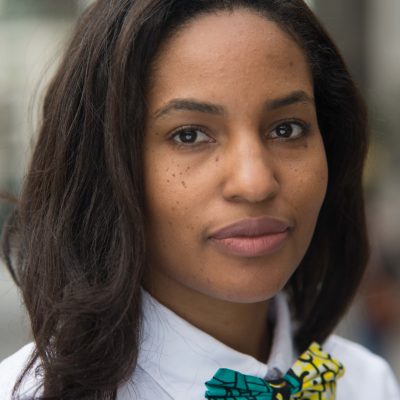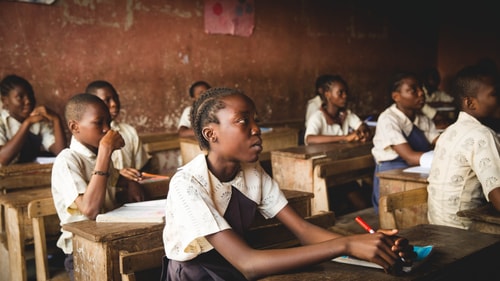On 19 February 2018, jihadist militant organisation Boko Haram abducted 110 girls from their school in Dapchi, Nigeria. Among them was Leah Sharibu, who was just 14 years old at the time. Five of the girls died in transit.
Following negotiations by the government, the remaining girls were put into vehicles to go home the next month, but as they were about to leave, the kidnappers told Leah, the only Christian, that in order to leave she had to convert. Leah refused.
In a moment of extraordinary courage, she decided that her faith was worth more than her freedom, despite her friends begging her to pretend to convert. She was forced to watch as her classmates return to their families as she stayed behind with the terrorists.
Leah has been held by Boko Haram ever since. In September 2018, they issued a final ultimatum on her life after executing Saifura Ahmed, a Muslim humanitarian worker who had been abducted in March 2018 along with two of her colleagues, Hauwa Liman and Alice Ngaddah. The following month Leah was spared, but Hauwa Liman was executed, and Boko Haram declared that Leah and Alice Ngaddah, also a Christian, would be their slaves for life. Another faction of the group is also holding the remaining 112 girls infamously kidnapped from their school in Chibok in 2014.
Still here. Still waiting for action.
Today, on 19 February, Christian Solidarity Worldwide (CSW) is marking the one-year anniversary of Leah’s abduction by holding a vigil outside the Nigerian High Commission in London, with the message: ‘Still here. Still waiting for action.’ You can join us at the protest or show your support by using our website to email the Nigerian government and call for Leah’s release.
Leah and the Chibok girls are emblematic of the many children in northern Nigeria who have had their education forcibly cut short. Boko Haram, whose name means ‘Western education is forbidden’, often targets schools, killing teachers and students and abducting girls and boys. Muslims and Christians suffer at their hands, but Christians are particularly targeted. Girls are often taken as slaves and boys are turned into child soldiers. Rather than school being a place of safety and empowerment in these conflict-ridden areas, it is instead a place of fear and danger.
Take part: Faith and a Future
Children from religious minority communities also face discrimination, abuse and sometimes even expulsion in several shari’a states. Several Christian parents in some of these states have reported that their children have had to adopt Muslim-sounding names and even adopt Muslim practices at school in order to receive state education.
CSW believes that no child should be denied the right to education on account of their beliefs. In 2018, we launched our Faith and a Future campaign calling for an end to practices such as these in Nigeria and four other countries, Burma, Iran, Mexico and Pakistan. You can add your voice to our campaign to ensure that no child faces discrimination in an educational setting on account of their faith, by signing our petition.
The power of prayer
At CSW we believe “the prayer of a righteous person is powerful and effective” (James 5:16); and one of the most important ways in which you can engage with our work throughout the year, alongside petitions and protests such as the ones above, is by praying. Our Prayer Diary has information on all of the countries that we work on, with a special focus on Christians and others who need support, and the pressing issues that need to be brought before God.
Nigeria is one of our countries of focus for prayer right now, given the postponement of the general election from 16 to 23 February, and the plight of Leah, Alice and the Chibok girls. In addition, Boko Haram has threatened to disrupt voting in the north east, and both factions appear resurgent. Last week one faction ambushed the Borno state governor’s convoy, killing or abducting more than 40 people, according to an informed source, while the group holding Leah conducted coordinated attacks in Yobe and Borno states that were repelled by the army.
Nigeria is also home to the Fulani militia, one of the deadliest terrorist groups in the world and one which is believed to have murdered more people than Boko Haram in recent years. During the first quarter of 2018, CSW documented at least 106 attacks on communities in central Nigeria that have claimed 1,061 lives.
The Fulani militia is well-armed, with reports of the regular use of AK-47s and in some cases even chemical weapons and rocket launchers. Despite the obvious threat posed by this militia, the government’s response to these attacks has been inadequate; no assailant has been brought to justice or even arrested, and this has emboldened perpetrators and entrenched a culture of impunity in the region.
CSW has continued to urge Nigeria to address the crisis caused by the Fulani militia, raising the issue with the UK and US governments on a regular basis, as well as at the United Nations Human Rights Council. In addition to taking part in today’s protest and signing the Faith and a Future petition, you can also write to your MP here in the UK, asking them to raise these issues with our government and to encourage it to call for effective action by Nigeria.
And together we must continue to lift the country and people of Nigeria up to God, asking him to protect all those facing violence at the hands of groups like Boko Haram and the Fulani militia, to ensure a peaceful, free and fair electoral process, equip the government with the wisdom and ability to address the issues faced by religious minorities in the country, and to change the hearts of those promoting intolerance, hatred and violence.



